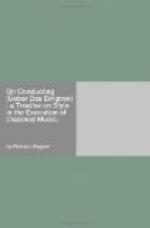If then our celebrated and uncelebrated conductors happen to be born for music only under the sign of Numbers (im Zeichen der Zahl), it would seem very desirable that some new school might be able to teach them the proper tempo for our music by the rule of three. I doubt whether they will ever acquire it in the simple way of musical feeling; wherefore, I believe, I have now reached the end of my task.
Perhaps the new school is already in sight. I understand that a “High-School of Music” has been established at Berlin, under the auspices of the Royal Academy of Arts and Sciences, and that the directorship of the school has been entrusted to the celebrated violinist, Herr Joachim. To start such a school without Herr Joachim, if his services are available, would be a great mistake. I am inclined to hope for much from him; because everything I know and have heard concerning his method of playing proves that this virtuoso is a complete master of the style of execution I demand for our classical music. By the side of Liszt and his disciples he is the only living musician to whom I can point as a practical proof and example in support of the foregoing assertions. It is immaterial whether or not Herr Joachim likes to see his name mentioned in such connection; for, with regard to that which a man can do and actually does, it matters little what he chooses to profess. If Herr Joachim thinks it expedient to profess that he has developed his fine style in the company of Herr Hiller, or of R. Schumann, this may rest upon its merits, provided he always plays in such wise that one may recognise the good results of several years intimate intercourse with Liszt. I also think it an advantage that when a “High-School of Music” was first thought of, the promoters at once secured the services of an admirable practical master of style and execution. If, to-day, I had to put a theatre capellmeister in the way of comprehending how he ought to conduct a piece, I would much rather refer him to Frau Lucca, than to the late Cantor Hauptmann at Leipzig, even if the latter were still alive. In this point I agree with the naive portion of the public, and indeed, with the taste of the aristocratic patrons of the opera, for I prefer to deal with persons who actually bring forth something that appeals to the ear and to the feelings. Yet, I cannot help entertaining some little doubt, when I see Herr Joachim—all alone and solitary— sitting on high in the curule chair of the Academy—with nothing in his hand but a violin; for towards violinists generally I have always felt as Mephistopheles feels towards “the fair,” whom he affects “once for all in the plural.” The conductor’s baton is reported not to have worked well in Herr Joachim’s hands; composition, too, appears rather to have been a source of bitterness to him than of pleasure to others. I fail to see how “the high-school” is to be directed solely from the




